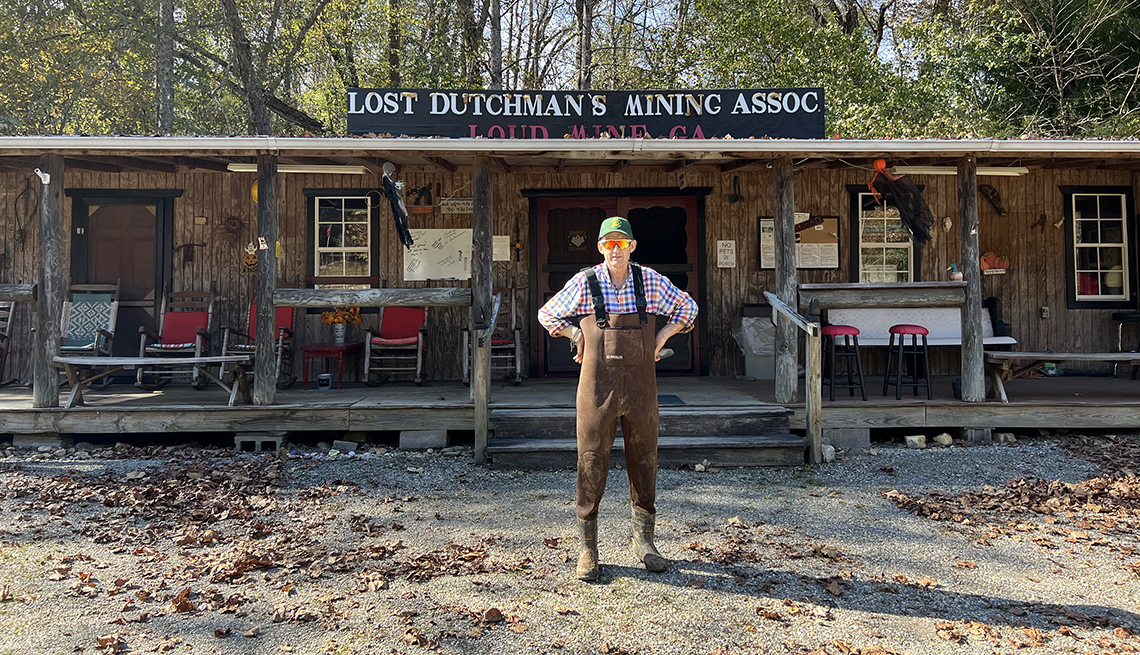
How — and where — to pan for gold
- Select a language for the TTS:
- UK English Female
- UK English Male
- US English Female
- US English Male
- Australian Female
- Australian Male
- Language selected: (auto detect) - EN
Play all audios:

There are other risks beyond a sore back to consider, however, mainly because you’ll typically be panning in wilderness areas where you have to look out for skunks, snakes and bears. “It’s
difficult when you have your head down and you’re concentrating on little flakes of gold in your pan,” says Mischler. “You just always need to be mindful.” Keep in mind, too, that
you'll be in or near water, and wet rocks can be slippery. If you’re in a wilderness area, a bad fall can mean a tough hike out. “I don’t go by myself,” Mischler says. “I always take a
friend or two.” WHERE TO SEARCH FOR GOLD Gold tends to concentrate downstream from large rocks, and it’s often associated with large quartz deposits. But those are just rules of thumb.
“Gold is where you find it,” Mischler says. And old gold mining sites are often good for finding gold these days. “The old timers didn’t have the new equipment that we have nowadays, so we
catch far more gold now than what they were catching way back when,” Conway says. Even the old California gold fields still have gold, Mischler says. After all, gold washes down from the
mountains periodically, and it’s been decades since the gold rush that started in the mid-19th century ended — during which time some streams may have changed course, opening up new places
with so-called pay dirt that may contain the precious metal. In fact, the recent heavy rains in California have lured a new wave of prospectors to the region. It does matter a great deal
what stream you choose for your panning expeditions. Panning for gold is illegal on U.S. government property, which rules out streams in national parks. Some state parks will allow panning
for gold, but many forbid using motorized equipment such as highbankers. If you’re panning on private property, be sure to ask the owner first. 6 PLACES TO PAN FOR GOLD Several sites around
the country offer the opportunity to try panning for gold — and some even provide pans and lessons on how to use them for a small fee or for free. Some areas may be fairly primitive.
Consider: ALABAMA GOLD CAMP, LINEVILLE, ALABAMA. A day pass costs $5, and you can also rent highbanking equipment. Open 8 a.m. to 6 p.m. BROKEN BOOT GOLD MINE, DEADWOOD, SOUTH DAKOTA. You
can get a gold panning lesson ($10) and tour the gold mine ($8) Open daily 8 am – 6 pm, May 27, 2023 through Labor Day. CACHE CREEK PROSPECTING SITE, NEAR GRANITE, COLORADO. This Bureau of
Land Management site is a former gold mine that’s open for nonmotorized gold panning. Free. LIBBY CREEK RECREATIONAL GOLD PANNING AREA, NEAR LIBBY, MONTANA. This area was formerly a gold
mining area, but about 10 to 15 percent of the gold was missed by the miners. Daytime panning and camping available. Free. MARSHALL GOLD DISCOVERY STATE HISTORIC PARK, COLOMA, CALIFORNIA.
Gold panning lessons are offered most days at 10 a.m., 11 a.m., 1 p.m., 2 p.m. and 3 p.m. Open 8 a.m. to 8 p.m. $10 per car; $9 for those 62 and older. REED GOLD MINE IN MIDLAND, NORTH
CAROLINA. Open Tuesday through Saturday between April and October 31. Tickets are $3 plus tax for ages 8 and older. Not surprisingly, some gold prospectors tend to be secretive. But many
aren’t, and gold prospecting clubs offer a way to learn how to pan for gold. Conway’s gold fever started with a trip to his local gold prospecting club. “And so, you know, boom, I’m out on
the creek … and, man, I think I’ve hit the mother lode,” he says. In reality, he had a panful of mica, which is worthless, but looks like gold on a sunny day. Undaunted, Conway has continued
panning and was eventually inspired to form the Georgia chapter of the GPAA. But even on days when you don’t find gold, panning can be rewarding. “It’s feet in the stream, hawks and eagles
flying overhead … I’ve seen some really cool nature things,” Mischler says. “For me, it’s just getting out and being in the water and coming home with gold in my pocket.”
